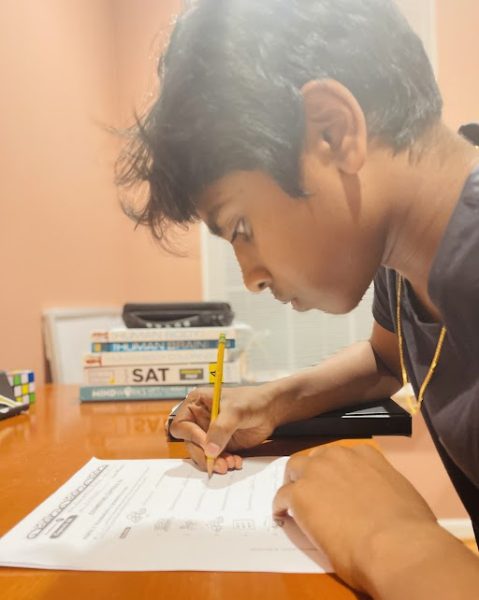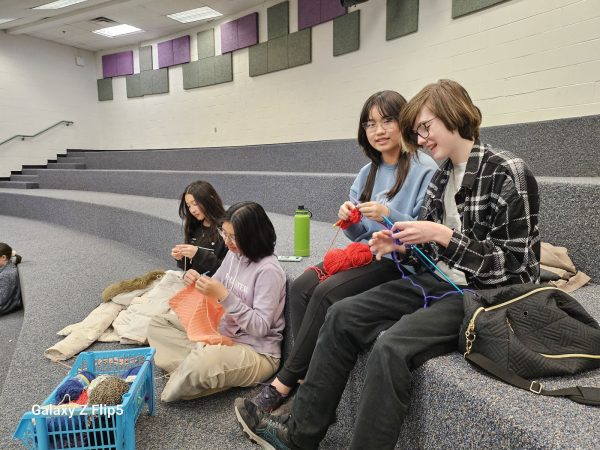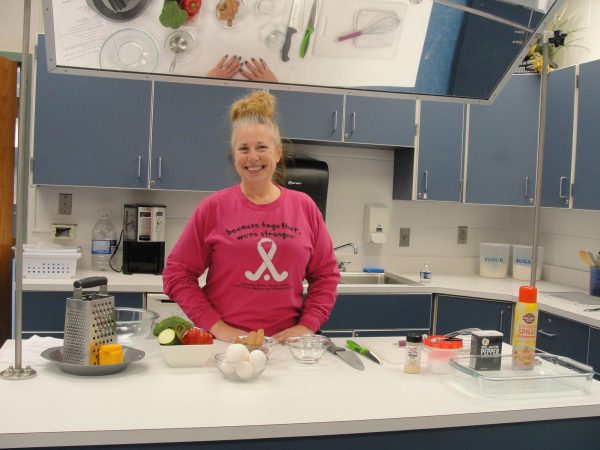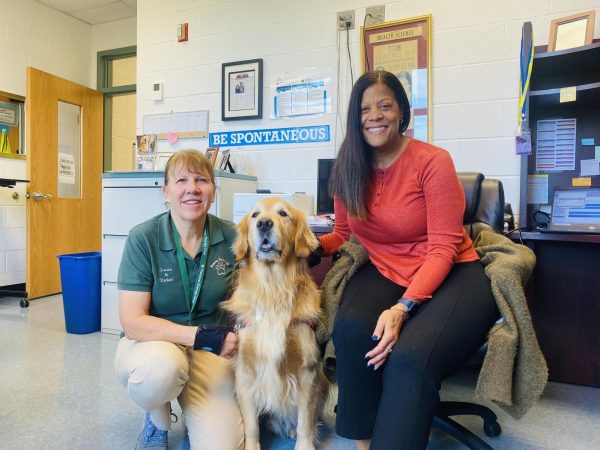Students’ view versus FCPS’s view from taking a Fine Arts class
Symphonic Band students playing Mystery and Mayhem while the Band Director, Ms. Tiffany Hitz, conducts.
Students who take Fine Arts classes may have different thoughts of the intended purpose of taking one. Students can choose to a variety of Fine Arts electives to enjoy themselves as well as challenge, and grow confidence.
“I want them to think creatively and make their own decisions and learn from their mistakes,” said Ms. Calandra Couch, an art teacher at RCMS. “And have fun.”
According to FCPS, 62 percent of eligible students take a fine arts course in the following school grades as elementary students take an art and music class weekly. FCPS says kids will discover their value, vision, and voice across the fine art electives.
They want middle school students to have purposeful and extensive academic success in the classes they take. They ought for kids to start getting some mastery or proficiency in their area as the courses are designed to develop growth and advanced learning. They use the Portrait of Graduate skills to enhance them to become creative thinkers, critical thinkers, and efficient communicators through kindergarten to twelfth grade.
Courses
At Rachel Carson Middle School, students can take two year-long electives, one year and two semester, or four semester electives. All music programs, except for Guitar and Music Lab, are year-long electives. Those two are semester electives. All Theatre classes, except for Advanced Drama, are semester classes. Advanced Drama is a year-long class. All Art classes are semesters, except for Year-Long Computer in Arts and Art Extensions. The two are year-long whereas Art Extensions is a recommendation from an Art Foundations teacher.
Classes
In the music program, students can choose from Orchestra, Band, and Chorus.
In-Band, there are three levels plus Percussion Ensemble according to the Panther Pathways pdf. Students will be placed in their suitable level based on the audition they do before the year begins.
Beginning Band includes the development of brass and woodwind instruments and guidance from one of the instructors on what instrument to play during the initial few weeks of school.
Intermediate Band students will further develop their skills on woodwind and brass instruments, and study a diverse amount of musical styles through the playing band literature. As of now, there are two intermediate Bands.
Advanced Band musicians will be instructed in a full-band environment and how it works. The challenge of different musical styles will be realized as they keep playing on. Currently, there are two Advanced Bands.
Percussion Ensemble focuses on the priorities of the students. They will be taught ensemble literature and performance and rehearsal techniques. Percussion Ensemble performs for the Beginning and Intermediate Bands.
In Orchestra there are five levels in which students can be placed through their audition.
“My expectations at the start of the year were that we were going to play tougher and more challenging songs than elementary school,” said Arjun Krishnamurthy, a seventh-grader on the Dream Team who takes orchestra.
The lowest level, Ensemble, is for any beginners who have one year of experience. Next, Concert, is a higher level for people who have one year of experience. Philharmonic is the next level for people with one year of experience. The highest two, Chamber and Symphonic, require two years of playing experience plus a successful audition.
Currently, Arjun is in Orchestra Ensemble and he wishes to get better at his violin.
“I have learned a lot so far,” he said. “I have learned how to play as an orchestra and I have learned more challenging songs.”
Orchestra can be learned in any grade.
“Totally!” said Mrs. Devyn Grimes, the Orchestra Director. “You can join Orchestra in eighth grade!”
In Chorus, there are five classes.
“I was expecting to make new friends,” Keya Shah, a seventh-grader on the Champions team, said. “And sing a lot.”
She said she did make many friends.
For seventh grade, students can be in either of five different classes with varying levels and voices based on their audition.
Males, for their changing or changed voices, will be placed in Bass Chorus. For females, they will be placed in the Treble Chorus. Respectively, they don’t need any experience. Both classes will focus on vocalization and sight-singing through choral literature.
There is an Intermediate Chorus for females. It focuses on correct vocal production and the development of musicianship in choral literature.
“I was expecting to learn about singing techniques,” Uma Sarkar, a seventh-grader on the Champions team, said. Uma did learn about singing techniques.
There are two Advanced Chorus, one for male and female. Both focus on advanced instruction in vocal techniques, as well as music fundamentals and sight-reading by doing difficult choral literature. Students will experience three or four-part singing. They will participate in concerts, choral choreography, and drama plays.
In the visual art program, students may choose between Art Foundations, Computers in Art, and 3-D Art Exploration. They may be recommended to Art Extensions, an advanced class of art students. You may choose to go or not.
“I thought Art would be an easy A but fun and challenging because it’s subjective,” said Fi Hoehne, a seventh-grader on the Champions team. She says she really enjoys the art electives.
For seventh grade, students will have to take Art Foundations before taking any other art class. In eighth grade, you do not need to except for Art Extensions.
Art Foundations diverge in the techniques of drawing, painting, sculpture, and printmaking. They use creative and critical thinking skills. Art Foundations focuses on the idea of transformation. Students can explore different art materials and student different artists. According to the Course Catalog, students will analyze, respond and produce meaningful artworks in an art studio environment.
“Art Foundations is an overview class so it’s a little bit of everything,” said art teacher Ms. Couch.
A student shares his answer to why he chose Art Foundations as one of his electives: “To get better at art,” said Lodyn Roldan, a seventh-grader on Dream Team.
Lodyn says that he is at a six to seven out of 10 on a scale of how good at art he is.
Computers in Arts deals with taking into account computers making artworks and animations. Students will use Adobe Photoshop, Game Maker 8, and Adobe Illustrator. Students can try digital tools such as graphic tablets and pens. They get to learn about current digital artists and trends.
“Computers in art is digital art and game making and photoshopping,” said Ms. Couch
“Some expectations I had was that I thought we would learn how to use Adobe Photoshop and Illustrator,” said Raagav Bala, a seventh-grader on Dream Team
Raagav is interested in animation and he chose that elective and really enjoyed it there. He did learn about the Adobe apps.
3-D Art Exploration deals with sculpting, three-dimensional objects, models, and installations. Students will use non-traditional and traditional tools to create artworks by using problem-solving, concept interpretation, personal style development, and skill refinement. They will also learn about artists and contemporary artists.
In the Theatrical Arts, there are four electives that students may choose from. One of them requires an audition.
Tech Theatre Appreciation is an elective for students who like Drama but not be on the stage. Tech Theatre students develop skills in lighting, sound, scenery, costumes, and stage management. Students will also work in groups.
“It’s all the things behind the scenes,” said Mr. Joshua Bickford, the Theatre Arts Director.
Rohan Punnoose, a seventh-grader on the Dream Team, is in Tech Theatre. “It’s a very fun environment and very friendly,” Rohan said.
Rohan says that his classmates were very friendly and they helped each other out. He also says he enjoyed his time there.
Speech Theatre Appreciation is a Drama elective for seventh-grade students with newfound acting interests. Students will work with tools for on stage and off stage. They will do audio and video editing, scriptwriting, storyboards, interviewing skills, audio and video equipment, correct research, digital photography, and computer software presentations.
“I chose theater because I wanted to get more confident and talk louder and I really kind of like acting,” Surya Raj said, a seventh-grader on the Trailblazers team.
Surya really liked it there and got into Advanced Theatre. Another addition to taking Drama was that he wanted to be less embarrassed on stage.
Theatre Appreciation is a Drama class for eighth-grade students. They will learn the basics of acting, performing, and teamwork. Students who take this class will enhance their confidence, creativity, and communication. They will learn about the importance of theatre arts in global areas.
“It’s performance-based and fewer work on projects,” said Mr. Bickford
Advanced Theatre is for students continuing to take Drama. Students will be expanding their knowledge and skills per the drama class they took earlier. They will be in dramatic activities and performances for different audiences.
FCPS Values and Teacher’s Values
FCPS has many values for each fine arts at middle schools as students will become collaborative and creative.
In art classes, FCPS hopes for a different type of art learning. They want to move from weekly art classes to a more focused environment. Students will learn about more concepts such as transformation, relationships, boundaries, and roles while doing art challenges. Students will have the opportunity to diverge into different art mediums and art materials. They will communicate themselves to their art as they will connect and use creative and critical thinking personal experiences. They also get to explore art trends now and artists back then. Students will get to develop or improve their art techniques and skills.
Music in middle school encourages different cultures of music. They will provide the key skills for students to become musically literate and well-rounded individuals according to FCPS Middle School Fine Arts. Students will collaborate among themselves to engage their life with art. Music programs are taught from kindergarten to twelfth grade for students to learn year by year and become artistic. Music programs are invited to perform at state, national, and international events.
“Make a great musical experience and have fun,” said Ms. Grimes. “Because that’s what music is all about.”
In theatre classes, FCPS focuses on skills of creativity, collaboration, and communication. FCPS’s theatre curriculum hopes to develop complex skills. Students will go on field trips to experience a live professional performance. They will also be able to participate in workshops, musicals, one-act performances, plays, clubs, competitions, and festivals.
Mr. Bickford said, “If the pandemic showed us anything, it’s that we need the arts in our lives.”










